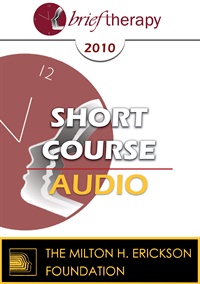
- Average Rating:
- Not yet rated
- Topic Areas:
- Short Courses | Reality Therapy | Brief Therapy | Role Play
- Categories:
- Brief Therapy Conference | Brief Therapy Conference 2010
- Faculty:
- Robert Wubbolding, EdD
- Duration:
- 1:28:33
- Format:
- Audio Only
- Original Program Date:
- Dec 09, 2010
- Short Description:
- Simulated role-play demonstrations, the focus of this session, illustrate the re-invented use of the WDEP system of reality therapy. A brief explanation of how reality therapy embraces principles of suggestion, reorientation and utilization precedes a brief overview of human motivation and how the WDEP system interfaces with Ericksonian Principles. Participants will gain practical ideas immediately useful on the job. Handouts suitable for photocopying will be provided.
- Price:
- $15.00 - Base Price
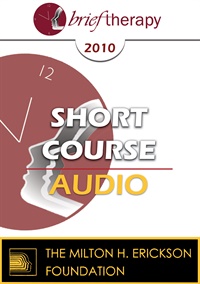
- Average Rating:
- Not yet rated
- Topic Areas:
- Short Courses | Brief Therapy | Unconscious Processes | Consciousness
- Categories:
- Brief Therapy Conference | Brief Therapy Conference 2010
- Faculty:
- James Rini | Melissa Rini, MS
- Duration:
- 1:30:13
- Format:
- Audio Only
- Original Program Date:
- Dec 09, 2010
- Short Description:
- Milton Erickson said, “Change first then insight.” Too often therapists try to produce change by giving clients insight into their problems expecting to produce results. This approach reduces effectiveness as it overestimates the power of the conscious mind while neglecting and underestimating the unconscious mind’s role in the healing process.
- Price:
- $15.00 - Base Price
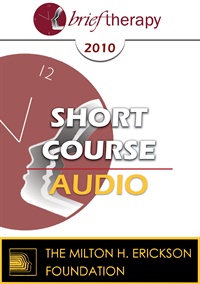
- Average Rating:
- Not yet rated
- Topic Areas:
- Children and Adolescent Therapy | Short Courses | Brief Therapy | Language of Hypnosis
- Categories:
- Brief Therapy Conference | Brief Therapy Conference 2010
- Faculty:
- Marilyn Wedge
- Duration:
- 1:05:37
- Format:
- Audio Only
- Original Program Date:
- Dec 09, 2010
- Short Description:
- The language a therapist uses to conceptualize and treat a problem determines whether or not that problem can be resolved effectively. Plato’s story of the cave, where the inhabitants see only shadows, is a useful metaphor for how the language of therapy can generate either confusion or clarity. The workshop will teach a method of effectively treating severe problems of children and adolescents, using an invariant opening question, strategic dialogue and metaphorical techniques.
- Price:
- $15.00 - Base Price
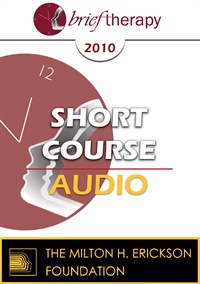
- Average Rating:
- Not yet rated
- Topic Areas:
- Depression | Short Courses | Brief Therapy
- Categories:
- Brief Therapy Conference | Brief Therapy Conference 2010
- Faculty:
- Consuelo Casula, Dipl. Psych
- Duration:
- 1:28:03
- Format:
- Audio Only
- Original Program Date:
- Dec 09, 2010
- Short Description:
- This workshop will present seven ingredients to draw from depressed patients in order to help them to find the harmony they need to start uplifting their lives. The ingredients are Hope, Awareness, Resiliency, Morality, Opportunity, Niceness and Yearning. Combined together, these ingredients are the leavening for a better future.
- Price:
- $15.00 - Base Price
Tags: Brief Therapy Depression
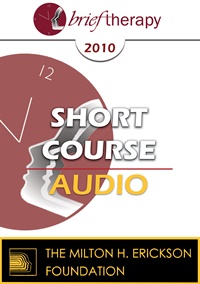
- Average Rating:
- Not yet rated
- Topic Areas:
- Anxiety | Short Courses | Brief Therapy | Ericksonian Hypnosis and Therapy Techniques
- Categories:
- Brief Therapy Conference | Brief Therapy Conference 2010
- Faculty:
- Joseph Dowling, MS, LPC
- Duration:
- 1:27:41
- Format:
- Audio Only
- Original Program Date:
- Dec 09, 2010
- Short Description:
- Milton H. Erickson, MD, understood that “the conscious (thinking) mind doesn’t do much of anything of much significance…while the unconscious mind is an infinite storehouse of dreams, potentials, and solutions…” This workshop will teach a brief, solution focused, strategic, and hypnotic approach to anxiety related disorders. Intellectualizing, analyzing, self-criticizing, WHY-ing and WHAT-IF-ing clients will be targeted as participants learn to employ Ericksonian interventions including solution-focused questions, strategic task assignments, and formal/conversational hypnosis via live demonstration, experiential exercise, and case studies.
- Price:
- $15.00 - Base Price
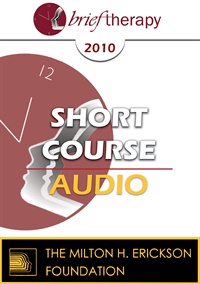
- Average Rating:
- Not yet rated
- Topic Areas:
- Short Courses | Brief Therapy | Footprinting | Relationships
- Categories:
- Brief Therapy Conference | Brief Therapy Conference 2010
- Faculty:
- Susan Dowell, MSW | Rick Miller, MSW
- Duration:
- 1:31:09
- Format:
- Audio Only
- Original Program Date:
- Dec 09, 2010
- Short Description:
- Footprintings® provides effective, easy to use tools for observing and experiencing Self States and repairing relational issues between them. Using color Footprints to diagram relationships between Parts, participants can step into different Self States, gaining deeper connection to body experience, affect and cognitive orientation of each State, while healing internal relationships.
- Price:
- $15.00 - Base Price
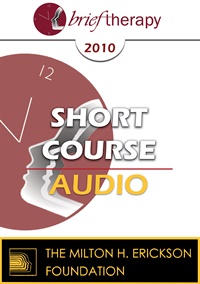
- Average Rating:
- Not yet rated
- Topic Areas:
- Neuroscience | Short Courses | Neurobiology | Brief Therapy | Mind-Body
- Categories:
- Brief Therapy Conference | Brief Therapy Conference 2010
- Faculty:
- Richard Hill, MBMSc, MEd, MA
- Duration:
- 1:30:17
- Format:
- Audio Only
- Original Program Date:
- Dec 09, 2010
- Short Description:
- Breakthroughs in neuroscience and neurophysiology explain how a mindset can alter what is turned on and turned off in the brain and the body. The work of Siegel, Rossi, Bandura, Aronson & Steele and Deci & Ryan act as pieces of a puzzle that explain why therapy can be disrupted by an imposed mindset and how this “winner/loser world” mindset is an unseen barrier to our more natural, creative, interpersonal process. A new, simple brief therapy is presented for lasting, transformational change.
- Price:
- $15.00 - Base Price
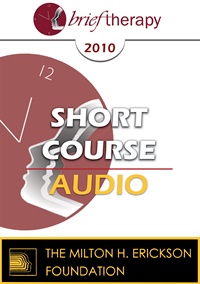
- Average Rating:
- Not yet rated
- Topic Areas:
- Children and Adolescent Therapy | Short Courses | Eating Disorders | Anorexia | Brief Therapy
- Categories:
- Brief Therapy Conference | Brief Therapy Conference 2010
- Faculty:
- Christine Silverstein
- Duration:
- 1:28:27
- Format:
- Audio Only
- Original Program Date:
- Dec 09, 2010
- Short Description:
- For centuries, clinicians have been baffled as to how to achieve healthy outcomes in the treatment of anorexia nervosa. In this workshop, the presenter will describe how she assisted a nine-year-old female soccer player, who experienced disordered eating. The techniques used to facilitate performance, such as goal-setting, mental rehearsal, and positive selftalk, will be explained, as well as unique approaches with Ericksonian hypnosis and imagery. The use of puppetry, which was an adjunct to Parts Therapy, will be demonstrated. With Christine Silverstein.
- Price:
- $15.00 - Base Price
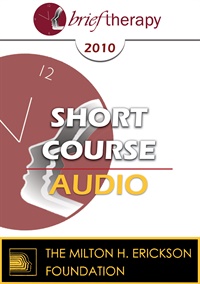
- Average Rating:
- Not yet rated
- Topic Areas:
- Hypnosis | Short Courses | Pain and Healing | Brief Therapy | Self-Hypnosis | Trance
- Categories:
- Brief Therapy Conference | Brief Therapy Conference 2010
- Faculty:
- Deborah Beckman
- Duration:
- 1:23:17
- Format:
- Audio Only
- Original Program Date:
- Dec 09, 2010
- Short Description:
- Clients in pain yearn for sleep; comfort just out of reach. Focus first on establishing soothing sleep and encouraging nocturnal restorative functions. Treating remaining pain stays in the day’s domain. Hypnosis enlists the mind and body’s natural processes, restoring healthy sleep. Strategic protocols combine physiology of sleep and pain management with the client’s own experience. These are further reinforced by self-hypnosis techniques. Program includes demonstration, application of trance script protocols, and case study discussion. With Deborah Beckman.
- Price:
- $15.00 - Base Price
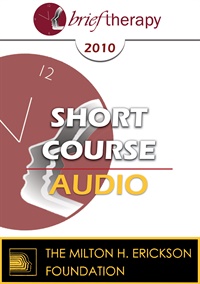
- Average Rating:
- Not yet rated
- Topic Areas:
- Family Therapy | Short Courses | Children and Adolescent Therapy | Brief Therapy
- Categories:
- Brief Therapy Conference | Brief Therapy Conference 2010
- Faculty:
- Bob Bertolino, PhD
- Duration:
- 1:31:15
- Format:
- Audio Only
- Original Program Date:
- Dec 09, 2010
- Short Description:
- A Strengths-Based Therapy approach provides practitioners with essential principles and practices for improving effectiveness and outcomes with adolescents and families. Participants in this workshop will be introduced to current research findings on effective practice and will learn key strategies to strengthen the therapeutic relationship and alliance, maximize client contributions to change, and respond efficiently to client progress. The strategies offered can be applied to a wide range of settings with a continuum of concerns.
- Price:
- $15.00 - Base Price
Please wait ...

